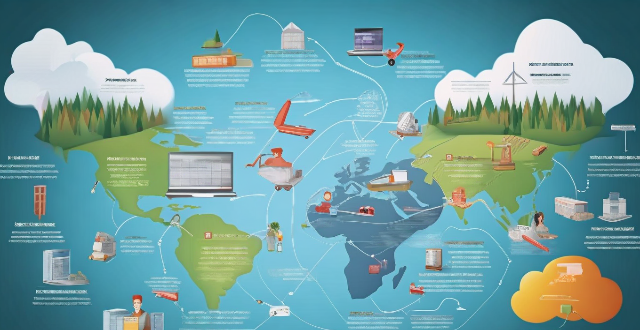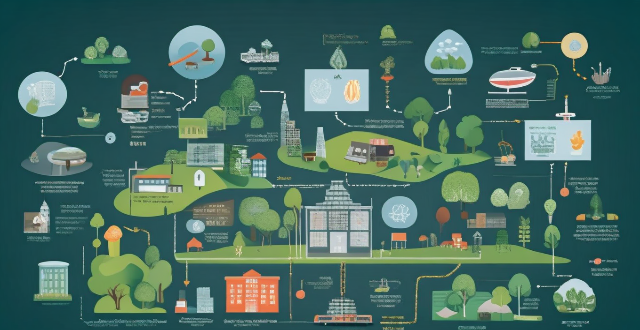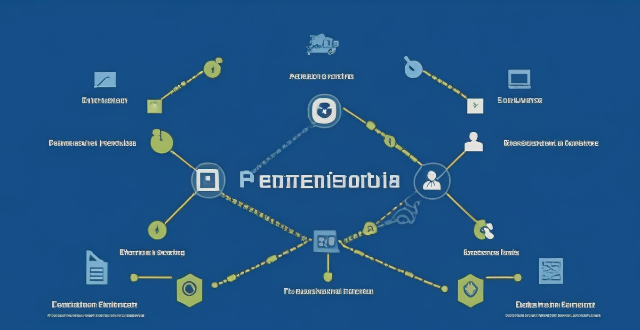Chain Climate

What are the economic implications of investing in climate-resilient supply chain infrastructure ?
This article explores the various economic implications of investing in climate-resilient supply chain infrastructure. It highlights how such investments can lead to cost savings, increased productivity and efficiency, improved insurance rates, enhanced supply chain visibility, and competitive advantage. The article also emphasizes the importance of building a strong brand reputation and accessing new markets through sustainable and resilient practices. Overall, it underscores the significance of prioritizing investments in climate-resilient supply chain infrastructure for businesses and economies around the world.

What are some best practices for managing risk associated with climate change in a global supply chain ?
This article outlines best practices for managing risk associated with climate change in a global supply chain. It suggests assessing climate change risks by identifying potential impacts and evaluating vulnerabilities, developing a risk management plan that includes setting clear objectives and implementing mitigation measures, and monitoring and reviewing performance through tracking progress against objectives and continuously improving strategies. Key strategies include diversifying supplier networks, investing in resilient infrastructure, improving energy efficiency, enhancing supply chain transparency, promoting sustainable practices, establishing regular reporting processes, benchmarking against industry standards, soliciting stakeholder feedback, revising risk management plans regularly, participating in collaborative learning opportunities, and fostering a culture of innovation within the organization.

How has the COVID-19 pandemic highlighted the importance of resilient supply chain management in the face of climate-related disruptions ?
The text discusses the impact of the COVID-19 pandemic on supply chain management and emphasizes the importance of resilient supply chain management to withstand future climate-related disruptions. The pandemic caused significant disruptions in the global supply chain, including disruption of global trade, bottlenecks, shortage of raw materials, and labor shortages. A resilient supply chain is adaptable, diversified, collaborative, and leverages technology to improve efficiency, reduce waste, and increase transparency. These characteristics ensure that the supply chain can withstand not only the current crisis but also future climate-related disruptions.

How does climate change affect global supply chain management ?
Climate change affects various aspects of life, including global supply chain management. Extreme weather events, rising sea levels, changes in agricultural production, energy costs, and labor availability are some ways in which climate change impacts this crucial aspect of business operations. Businesses must adapt their strategies to mitigate these risks and ensure the continued efficiency and effectiveness of their operations.

How can smart contracts improve supply chain management ?
Smart contracts can revolutionize supply chain management by automating transactions, enhancing transparency, improving efficiency, enabling real-time tracking, and reducing risks. This decentralized and automated approach can save time, reduce costs, prevent fraud, and improve overall trust between parties in the supply chain.

How can blockchain solve the issue of supply chain management ?
Blockchain technology can revolutionize supply chain management by addressing various challenges faced by businesses. It improves visibility and traceability, reduces paperwork and manual processes, streamlines payment processes, enhances data security, and builds trust among stakeholders. With its potential to solve many of the issues faced by businesses in supply chain management, blockchain is an ideal solution for modern supply chains.

What policies and regulations are currently in place to encourage more sustainable supply chain practices ?
Policies and Regulations Encouraging Sustainable Supply Chain Practices discusses various government initiatives, industry standards, and international agreements that promote sustainable supply chain practices. Government policies such as green procurement, carbon pricing, and eco-labels incentivize businesses to adopt environmentally friendly operations. Industry standards like CSR and LCA help companies understand and reduce their ecological footprint. International treaties like the Paris Agreement and Basel Convention provide a global framework for sustainable practices. Together, these measures form a comprehensive system to support sustainable supply chains worldwide.

What are the benefits of staying at a small, boutique luxury hotel versus a larger chain resort ?
Staying at a small, boutique luxury hotel offers several advantages compared to a larger chain resort, including personalized service, unique ambiance, a quieter environment, local flavor, and exclusivity.

How do circular economy principles apply to supply chain management, and what benefits do they bring in terms of climate change adaptation ?
The circular economy is a regenerative system that replaces the "end-of-life" concept with reducing, alternatively reusing, sharing, repairing, refurbishing, remanufacturing and recycling existing materials and products. This approach minimizes waste and pollution, extends product lifecycles, and helps to mitigate climate change. In supply chain management, applying circular economy principles can bring significant benefits in terms of climate change adaptation. The key principles of circular economy in supply chain management include design for recycling and reuse, extended producer responsibility (EPR), circular procurement, collaborative partnerships, resource efficiency, digital tracking and transparency, reduction in greenhouse gas emissions, conservation of natural resources, increased resilience, innovation and economic opportunities, and improved waste management. By adopting these practices, organizations can contribute to a more sustainable economy that reduces environmental impacts and builds resilience against the effects of a changing climate.

What is the role of consumers in driving more sustainable supply chain practices through their purchasing decisions ?
Consumers play a crucial role in driving more sustainable supply chain practices through their purchasing decisions. By choosing products that are produced using environmentally friendly and socially responsible methods, consumers can influence companies to adopt more sustainable practices throughout their supply chains. This can lead to reduced carbon emissions, improved working conditions, and better resource management. The key points include education and awareness, green consumerism, supplier selection, product design, brand loyalty, public pressure, regulatory influence, investor interest, innovation, and collaboration.

In what ways can businesses engage in sustainable supply chain management as a key component of their CSR programs ?
The text discusses the importance of sustainable supply chain management in corporate social responsibility (CSR) programs. It emphasizes setting clear objectives and goals, conducting supplier audits and assessments, collaborating with suppliers, measuring performance and reporting results, and continuously improving and innovating as key steps in sustainable supply chain management. The text suggests that these practices can help businesses demonstrate their commitment to sustainability while also improving their bottom line.

Can sustainable supply chain practices help reduce carbon emissions and combat climate change ?
Sustainable supply chain practices can play a crucial role in reducing carbon emissions and combating climate change. By focusing on resource efficiency, waste reduction, transportation optimization, supplier management, lifecycle assessment, renewable energy adoption, and employee involvement, companies can significantly lessen their environmental impact. These efforts not only contribute to global sustainability goals but also offer potential reputational, efficiency, and cost benefits for businesses.

Can blockchain technology help combat climate change ?
Blockchain technology can contribute to the fight against climate change by enhancing transparency, efficiency, and traceability in areas such as carbon credit trading, renewable energy management, and sustainable supply chain management. However, challenges related to scalability, energy consumption, and regulation must be addressed to fully realize its potential benefits.

How do climate-related concerns influence consumer choices in the food industry ?
Climate change is a pressing issue that affects various aspects of life, including the food industry. As consumers become more aware of their environmental impact, they are increasingly making choices based on climate-related concerns. This shift in consumer behavior has significant implications for food producers, retailers, and the entire supply chain. Factors influencing consumer choices include environmental sustainability, health considerations, economic factors, ethical concerns, personal values and beliefs. The impact on the food industry includes product development, supply chain management, marketing strategies, retail practices, and policy influence. Businesses that adapt to these changing preferences by embracing sustainability and transparency are likely to gain a competitive edge in the marketplace. It is essential for companies to anticipate and respond to these trends to maintain relevance and profitability while contributing positively to the environment.

How can businesses benefit from investing in Climate-Smart Technologies ?
Businesses can benefit from investing in climate-smart technologies by improving efficiency, reducing costs, gaining a competitive edge, staying compliant with regulations, mitigating risks associated with climate change, and attracting talent.

Can technology help improve food security in a changing climate ?
In the face of climate change, technology offers numerous solutions to enhance food production and distribution, contributing to global food security. Key areas where technology can make a significant impact include precision farming, genetic engineering, data analytics, water management, digital infrastructure, supply chain optimization, urban agriculture, and policy support. By leveraging these technological advancements, we can mitigate the adverse effects of climate change on agriculture and ensure a stable and sustainable food system for all.

What role do corporations have in upholding climate ethics ?
The text discusses the vital role of corporations in maintaining climate ethics, emphasizing their responsibilities in areas such as emissions control, innovation for sustainability, education and advocacy, stakeholder engagement, and making ethical investment decisions. Corporations are urged to take proactive steps towards reducing direct and supply chain emissions, investing in green technologies, promoting eco-friendly products, raising consumer awareness about environmental issues, influencing policies that support climate ethics, engaging with affected communities, and being transparent about their environmental performance. Additionally, companies should consider green investments and divest from fossil fuel industries to demonstrate a commitment to combating climate change. The essay concludes that corporate actions set standards for others, playing a crucial part in fostering a global approach to climate ethics.

What is the future of Climate-Smart Technology ?
The future of climate-smart technology is expected to be transformative, offering numerous ways to mitigate climate change and adapt to its effects. Key areas of development include renewable energy, energy efficiency, carbon capture and storage, water management, and agriculture. Emerging technologies such as artificial intelligence, blockchain, and the Internet of Things also have significant potential in this field. However, challenges such as cost, infrastructure, regulation, and public acceptance must be addressed to ensure widespread adoption and effectiveness.

How can we ensure that climate debt is taken seriously by governments and corporations ?
Climate debt, a concept recognizing the cumulative GHG emissions primarily from industrialized nations and their impacts on vulnerable populations, calls for action. Strategies to ensure its serious consideration by governments and corporations include raising public awareness, implementing policy initiatives, utilizing financial mechanisms, enhancing international cooperation, promoting corporate responsibility, fostering innovation, ensuring accountability, and engaging in socially responsible actions. These efforts aim to create an environment where stakeholders actively work towards mitigating climate change's impacts.

How can blockchain technology improve supply chain management in transportation ?
Blockchain technology can improve supply chain management in transportation by providing enhanced transparency, increased efficiency, improved security, and greater collaboration. This can lead to reduced costs, faster dispute resolution, and improved customer satisfaction. Blockchain allows for real-time tracking of goods, shared data access, automated processes, and reduced paperwork. It also ensures data integrity, builds trust among parties, and helps mitigate risks. By encouraging collaboration and open standards, blockchain promotes innovative solutions that can further improve supply chain management in transportation.

How can companies incorporate climate resilience into their workforce development strategies ?
Incorporating Climate Resilience into Workforce Development Strategies Climate resilience is essential for businesses to withstand and recover from climate-related stresses and shocks. Companies can build a resilient workforce by developing a climate resilience training program, integrating sustainability into company culture, enhancing adaptive capacity, building partnerships and collaborations, investing in technology and innovation, promoting health and well-being, and implementing resilience in operations. These strategies require a multifaceted approach that includes education, cultural integration, skill enhancement, partnerships, technological innovation, health promotion, and operational resilience. By taking these steps, companies can protect their business interests and contribute positively to the global effort in combating climate change.

How can blockchain technology be used in supply chain management ?
Blockchain technology is poised to revolutionize supply chain management by offering transparency, traceability, and security. Smart contracts automate transactions, while secure data sharing promotes collaboration. The technology also reduces manual processes, paperwork, and enhances compliance.

Why is climate risk management important for businesses and organizations ?
Climate risk management is crucial for businesses and organizations due to its impact on operations, financial implications, reputational considerations, legal and compliance obligations, and ethical responsibilities. Supply chain disruptions, physical asset damage, regulatory changes, insurance costs, investor pressure, capital at risk, public perception, stakeholder engagement, leadership opportunities, compliance with laws, contractual obligations, sustainability goals, and intergenerational equity are all affected by climate change. Proactive climate risk management can protect assets, maintain investor confidence, uphold reputation, meet compliance requirements, and fulfill ethical responsibilities to current and future generations.

What are the economic implications of climate disasters ?
Climate disasters have significant economic implications, including direct costs such as infrastructure damage and agricultural losses, indirect costs like lost productivity and investment uncertainty, and global impacts on trade and commodity prices. Addressing climate change is crucial for protecting the economy and ensuring sustainable development.

How can businesses contribute to climate resilience ?
Climate resilience refers to the ability of a system, community, or society to withstand and recover from the impacts of climate change. Businesses have a significant role to play in building climate resilience. Here's how they can contribute: 1. Reducing Greenhouse Gas Emissions: Businesses can invest in energy-efficient technologies and practices to reduce their carbon footprint. They can also switch to renewable energy sources like solar, wind, or hydroelectric power to significantly reduce greenhouse gas emissions. 2. Sustainable Sourcing and Production: Businesses can ensure that their suppliers adhere to sustainable practices, reducing the environmental impact of their products. By using resources more efficiently and reducing waste, businesses can minimize their environmental footprint. 3. Investing in Research and Development: Businesses can invest in research and development of clean technologies that can replace fossil fuel-dependent processes. Encouraging innovation within the company can lead to new solutions for reducing environmental impact and increasing sustainability. 4. Adapting to Climate Change: Businesses can design and build infrastructure that is resistant to extreme weather events caused by climate change. Implementing efficient water management systems can help businesses adapt to changing water availability due to climate change. Diversifying supply chains can reduce the risk of disruptions caused by climate-related events. 5. Advocating for Climate Action: Businesses can use their influence to advocate for policies that support climate resilience and sustainability. Collaborating with other businesses, governments, and non-governmental organizations can amplify efforts to build climate resilience. Raising public awareness about climate change and its impacts can help create demand for more sustainable products and services. 6. Community Engagement and Support: Providing education and training on climate resilience can empower communities to adapt to changing climate conditions. Supporting disaster preparedness programs can help communities cope with climate-related emergencies. Partnering with local organizations can help businesses understand and address the specific challenges faced by their communities due to climate change.

What are the benefits of adopting a climate leadership approach in business ?
Adopting a climate leadership approach in business is crucial for several reasons. Here are some benefits: 1. **Enhanced Reputation and Brand Image**: Companies that prioritize sustainability often enjoy enhanced reputations among consumers, investors, and the general public. This can lead to increased brand loyalty and customer satisfaction. 2. **Risk Management and Resilience**: A proactive approach to climate change helps businesses identify and mitigate potential risks associated with extreme weather events, supply chain disruptions, and regulatory changes. Investing in renewable energy sources, efficient infrastructure, and sustainable practices can make businesses more resilient to the impacts of climate change. 3. **Financial Performance and Cost Savings**: Implementing energy-efficient technologies and processes can lead to significant cost savings on utility bills. Many investors now prefer to invest in companies with strong environmental credentials, making it easier for these businesses to secure funding. Embracing climate leadership can also spur innovation, leading to the development of new products, services, or processes that generate additional revenue streams. 4. **Attracting and Retaining Talent**: Younger generations are passionate about working for companies that share their values on sustainability and social responsibility. Offering a workplace culture that aligns with personal values can improve employee satisfaction and reduce turnover rates. 5. **Compliance with Regulations and Reporting Requirements**: As governments around the world implement stricter environmental regulations, adopting a climate leadership approach ensures businesses stay ahead of these changes. Many stakeholders, including investors and consumers, now expect companies to report on their environmental impact. Being proactive in this area simplifies reporting requirements and demonstrates transparency.

How do geopolitical factors influence the sustainability efforts of global supply chains ?
Geopolitical factors significantly influence sustainability efforts in global supply chains by affecting trade policies, political stability, resource control, infrastructure development, and cultural attitudes towards sustainability. These elements determine the costs, efficiency, and environmental impact of global production networks. Understanding these dynamics is vital for businesses aiming to build resilient and sustainable supply chain operations.

What are the potential consequences of ignoring climate change ?
The text discusses the potential consequences of ignoring climate change, including environmental effects such as extreme weather events and loss of biodiversity, economic disruptions like damage to agriculture and infrastructure, public health issues including the spread of diseases and heat-related illnesses, and social impacts such as forced migration and reduced quality of life. It emphasizes the importance of addressing climate change to avoid these catastrophic implications for our planet and all life on it.

What role do technology and innovation play in improving sustainability within supply chain management ?
Technology and innovation are crucial for enhancing sustainability in supply chain management. They enable real-time monitoring, process optimization, energy efficiency, waste reduction, and transparency. By adopting these advancements, businesses can create environmentally friendly operations while maintaining profitability.

What is the significance of traceability in the food supply chain for food safety ?
Traceability in the food supply chain is crucial for food safety, enhancing transparency, facilitating recalls, improving quality control, supporting regulatory compliance, enabling better risk management, and promoting sustainable practices.